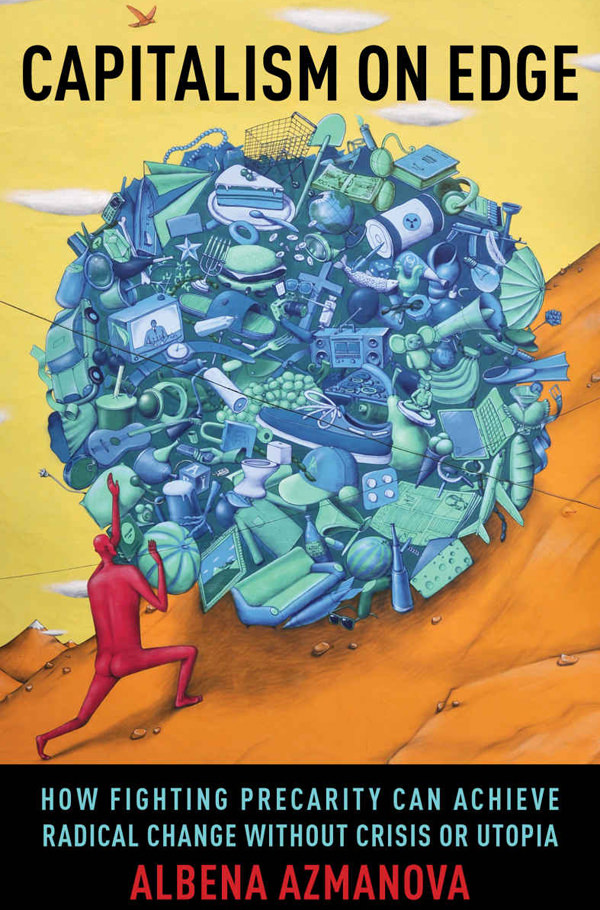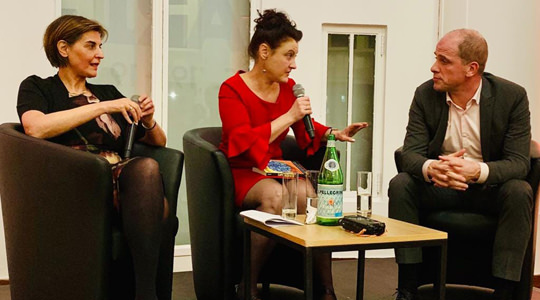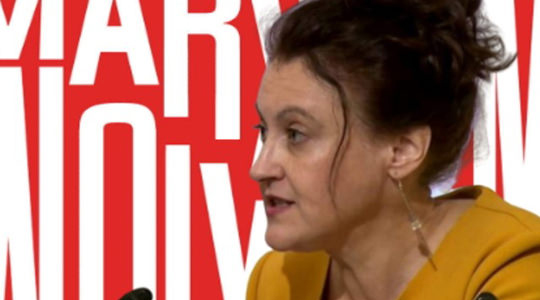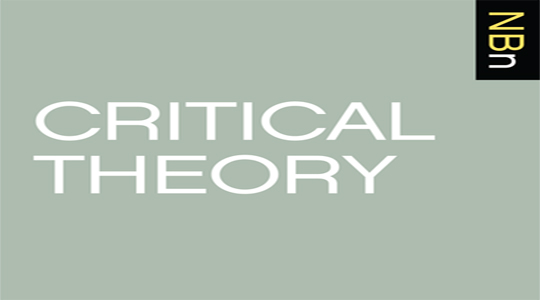
Capitalism on Edge
How Fighting Precarity Can Achieve Radical Change Without Crisis or Utopia
The wake of the financial crisis has inspired hopes for dramatic change and stirred visions of capitalism’s terminal collapse. Yet capitalism is not on its deathbed, utopia is not in our future, and revolution is not in the cards. In Capitalism on Edge, Albena Azmanova demonstrates that radical progressive change is still attainable, but it must come from an unexpected direction.
Azmanova’s new critique of capitalism focuses on the competitive pursuit of profit rather than on forms of ownership and patterns of wealth distribution. She contends that neoliberal capitalism has mutated into a new form—precarity capitalism—marked by the emergence of a precarious multitude. Widespread economic insecurity ails the 99 percent across differences in income, education, and professional occupation; it is the underlying cause of such diverse hardships as work-related stress and chronic unemployment. In response, Azmanova calls for forging a broad alliance of strange bedfellows whose discontent would challenge not only capitalism’s unfair outcomes but also the drive for profit at its core. To achieve this synthesis, progressive forces need to go beyond the old ideological certitudes of, on the left, fighting inequality and, on the right, increasing competition. Azmanova details reforms that would enable a dramatic transformation of the current system without a revolutionary break. An iconoclastic critique of left orthodoxy, Capitalism on Edge confronts the intellectual and political impasses of our time to discern a new path of emancipation.
Awards
The American Political Science Association's 2021 Michael Harrington Book Award, which "recognizes an outstanding book that demonstrates how scholarship can be used in the struggle for a better world"
The International Studies Association's 2022 Best Book prize for International Political Economy
Honorable mention, The British International Studies Association's 2021 Susan Strange Best Book Prize
Impactful Research of the Year, 2024. Triple E Awards (Entrepreneurship and Engagement Excellence in Higher Education) by the Accreditation Council for Entrepreneurial and Engaged Universities (ACEEU)
Reviews
With great insight, Albena Azmanova gives us a new way of understanding modern capitalism: through profit-driven corporations generating endless insecurity. But rather than despair, Azmanova finds reason for hope in a potential political coalition of unlikely partners. Thoroughly researched, powerfully argued.
In her revolutionary book, Albena Azmanova offers a new conceptual toolbox for the radical critique of capitalism and ultimately, radical change. Forget who owns what. Everyone, rich or poor, capitalist, managers or worker, suffers from capitalism's relentless competition for profit, more than ever as precarity capitalism now reigns supreme. This is thus where radical policies by public authorities and radical actions by the rest of us must strike. Let us forge new alliances, she suggests, to subvert capitalism from within. Let us multiply new practices inspired by our daily experiences of injustice―from job sharing to citizenship-based social insurance, to reinventing the social meaning of education, health care and the arts. Let us usher in a new politics of trust. Do not despair, dear reader. Azmanova offers us nothing less than a new realist prophecy for our collective emancipation from all forms of social domination and thus from capitalism itself. Profoundly innovative and inspiring.
Capitalism on Edge is mature, insightful, and elegant in its focus on the fragility and structural crises of today's capitalism and its legitimacy, as well as the possibilities of finding a way out for us as a polity and society. It is not a nostalgic look back but a very critical and somber insight into systemic decay, and this angle is very original. To many readers, Azmanova's argument may be unsettling. Traditionally, in academic and intellectual debates, discussions of the crises of and in the system are framed around two very different narratives. On the one hand, the advocates of the current system tend to discuss prospects of where capitalism may take us next (prioritizing economic, technological and ideational forces of 'universal' capitalism in overcoming the failures of the model). On the other hand, critics have spent decades writing about the need to abandon capitalism altogether and build an alternative system, usually represented by socialism. Azmanova appears to be in neither of those camps, which is why the book may rattle some readers and provoke debates and even fierce criticism.
Typically, critics of capitalism identify its ills primarily with greater inequality, and propose redistributive reforms to alleviate it, but in Capitalism on Edge, Albena Azmanova takes a refreshingly different view. She takes aim at the way today's capitalism, subject to automation and globalization, has created greater insecurity and uncertainty. What she calls 'precarious capitalism' threatens the white-collar office worker as well as blue-collar factory operative. Azmanova, who grew up during the death throes of Eastern European socialism, doesn't see socialism as an alternative, but instead a set of radical measures that would create what she calls a 'political economy of trust.' These reforms would subvert rather than destroy capitalism. With Europe's major parties in disarray and the two American parties at loggerheads, hers is a welcome commentary on how the left and the 99 percent can address the growing concern that many feel about their futures under global, postindustrial capitalism.
In her ambitious yet transparent and accessible treatise on the nature of present-day capitalism and its demise, Azmanova highlights the dark side of the competitive production of profit. This consists of the lived experience of uncertainty, insecurity, injustice, risk, and fear that affects the vast majority of people in Western societies. For them, capitalism is a game that consists of the blaming of victims, losers, and the structurally disempowered. Rather than invoking the revolutionary action of some strategically privileged class, a terminal crisis of capitalism, or a utopia of 'socialism,' the author explores and advocates for the potential of a radical subversive pragmatism. People simply want to do other things than give in to the pressure to enhance their employability in a treadmill of jobless non-growth. And policies, she demonstrates, can help to achieve such post-capitalist desires. A daring yet encouraging message.
In the wake of the Great Recession as well as the more recent rise of right-wing populist movements and parties, invocations of crisis as well as projections of utopias and dystopias heve gained newfound currency in both popular and academic discourse. Read Full Review in Philosophy and Social Criticism.
Once in a long while a new book comes along that challenges prevailing patterns of progressive social and economic thought in a way that is both deep and far-reaching, yet still evidently originating from within the critical left, so as—potentially—to prove persuasive to thoughtful and open-minded progressives. Capitalism on Edge is such a book. Read Full Review in Democracy journal.
Albena Azmanova's book Capitalism on Edge provides a stark wake-up call for Critical Theory to not only take the critique of political economy seriously again, but also face up to new social realities. Read Full Review in Journal of Classical Sociology.
I must admit that when I first flipped through Capitalism on Edge: How Fighting Precarity Can Achieve Radical Change Without Crisis or Utopia by Albena Azmanova, it did not look too inviting. The blurbs on the jacket did nothing to reassure me, suggesting that this was yet another post-Marxist critique of greedy capitalists and their enablers. As it turns out, it is, but in a way that is more interesting than I had assumed. As soon as I started reading the Introduction, I was gripped by the lucidity of ideas and clarity of the prose. Read Full Review in 3 Quarks Daily.
Rather than focusing on the origins of neoliberalism, Albena Azmanova's Capitalism on Edge demonstrates the ways neoliberalism in practice has led to a new precarity capitalism. Read Full Review in Los Angeles Review of Books
What could it mean to overcome capitalism today? This timely question is at the heart of Albena Azmanova’s brilliant and provocative Capitalism on Edge. Azmanova’s book represents critical theory at its best, seamlessly integrating philosophical, sociological, and political perspectives and debates to produce a compelling account of the (non)crisis of capitalism and the current conditions of social change. While political economy had, for a time, become a surprisingly neglected topic among critical theory scholarship, Capitalism on Edge returns critical theory to its roots: the interdisciplinary evaluation of capitalism as a social form. Read Full Review in Constellations.
According to Professor Albena Azmanova , taxing wealth is the starting point, not out of envy of those who have a lot or to make everyone equally rich, but because they represent a returning feudalism and a self-protected oligarchy, conditions that clash with the competitive premises of the capitalist system and democracy. Read Full Review (in Italian) in Domani
In both intelligence and experience, Albena Azmanova stands well above the common run of contemporary ‘Leftists’ (and ‘Rightists’). As a young Bulgarian dissident during the Cold War, she had occasion to see the difference regimes can make in the lives of those who live under them. Unlike many of her political friends from that place and time, she has remained steadfast in her commitment not only to democracy but also to the Marxism which animated the regime she opposed. Read Full Review at Will Morrisey Reviews
The fact that the radical left has replaced the slogan "Down with capitalism!" with "Tax the rich!" – does this mean that the capitalist social order is now fully accepted? In "Capitalism on the Edge," philosopher Albena Azmanova questions the growing critique of the super-rich. Read Full Review at Svenska Dagbladet – Sweden's quality site for news
Videos
Capitalism on Edge, book talk (FULL)
I present my book Capitalism on Edge (Columbia University Press, 2020) in Conversation with Vula Tsetsi and Diederik Samsom, 6 Feb. 2020, BOZAR, Brussels
"Capitalism on Edge" presentation
What this book is about: how to overcome capitalism without relying on a grand crisis, revolution, or a Utopia.
The European Green Deal will remain a fantasy unless ...
The European Green Deal will remain a fantasy unless we replace the growth-and-redistribution formula of economic justice with one focused on fighting precarity; in this way environmental justice will become compatible with social justice.
On the anti-capitalist upheaval
I speak about my book Capitalism on Edge: the massive economic insecurity (precarity) is what ails the 99 per cent, not inequality and stagnant wages.
On subverting capitalism
We do not need to endorse any grand utopia in order to mobilise the anti-capitalism wave that is growing now; we need to break away from the straightjacket of the choice capitalism or socialism.
This is not populism
We should drop the label 'populism'. The anti-establishment parties and movements express a new agenda of four concerns: physical insecurity, cultural estrangement, political disorder, economic instability.
The urgent policy changes now
I speak on the sources of precarity and what we can do against this.
Socialism and capitalism are similar
We must drop the obsession with growth and focus instead on stability so that people can think big again.
Diederik Samsom and Vula Tsetsi on the European Green Deal
Diederik Samsom, Vula Tsetsi and Albena Azmanova on the Green Revolution from book launch of Albena Azmanova's Capitalism on Edge, 5 Feb. 2020, BOZAR, Brussels
Albena Azmanova, Ivan Karstev & Robert Misik: CAPITALISM ON EDGE
The wake of the financial crisis has inspired hopes for dramatic change and stirred visions of capitalism’s terminal collapse. Yet capitalism is not on its deathbed, utopia is not in our future, and revolution is not in the cards. In Capitalism on Edge, Albena Azmanova demonstrates that radical progressive change is still attainable, but it must come from an unexpected direction.
On competitive pursuit of profit, precarious capitalism and paradox of emancipation
Albena Azmanova - associate professor at Kent University and political theorist, grants this interview to the Barricade's Maria Cernat. In this first part (out of three parts) of the interview, Azmanova speaks about her way from an young Bulgarian, who reaches social maturity at the beginning of Bulgaria's transition to the position of a leading Wester scholar on political theory and capitalism. She also outlines her understanding that competitive pursuit of profit is what makes capitalism precarious. If workers take control of the means of production, they will simply become part of the competitive pursuit of profit. So change should be looked for in other place. Also, the fight against inequality legitimises the rat race within which we look for inclusion. This is the paradox of emancipation in her view.
On how fear and precarity push people to conservatism
Economic crisis doesn't automatically radicalise the people to the left. If there is no plausible utopia, they go to the right. This is what Albena Azmanova, associate professor at Kent University, says in the second part of the interview, which she grants to the Barricade's Maria Cernat. Fear, precarity, insecurity make people become more conservative, puts them at odds with change. What follows is "our capitalism" (the one of traditionalists) against "their capitalism" (the one of cosmopolitans).
On change and subversion of capitalism
For Azmanova the solution to today's problems of capitalism is not in utopia or in revolution, but in small steps that allow us to have development, to decommodify parts of our activity, to tame the competitive pursuit of profit. Plenty of the winners of today's system are also feeling insecure. That is how there are large groups of society, who can realise that competitive production of profit is what troubles them.
The Ends of Precarity Capitalism
An Author Meets Critics Panel
Author-meets-critics panel on Capitalism on Edge with Amy Allen, Claus Offe, Paul Apostolidis, Lea Ypi; interventions by David Owen, William Callison, James Galbraith, Noëlle McAfee, convened and moderated by Azar Dakwar.
Battlegrounds of justice — what really grieves the 99%
Before the pandemic, progressive forces were mobilising under the banner of fighting inequality. The pandemic, however, has revealed that the scourge of our societies is the generalised precarity — the massive economic and social fragility that four decades of cuts to public spending created. What policies are necessary for a swift change of direction?
Precarity and Subversion
The New Language of Radicalism
I open the Guest Lecture series at Fisher Center for Gender and Justice at Hobart & William Smith Colleges with a discussion of precarity, the meta-crisis of capitalism and subversion as a form of radical change without a revolutionary break.
Events

Book Launch Event
'Capitalism on Edge'
I discuss the political implications of my analysis, with Vula Tsetsi, Secretary-General of the Greens in the European Parliament, and Diederik Samsom, Head of Cabinet of Executive Vice-President Timmermans responsible for the European Green Deal.
Event Details
At the Edge Interview
On Generalized Precarity and Subversive Pragmatism
Organized by This Is Hell!, WNUR Chicago
It is the peculiarity of our historical time that revolution is not in the cards - so I'm asking if this is not very likely to happen, do we have to give up? I say no, we can find resources for a radical change, without the crutch of a revolution, without the crutch of crisis, without the crutch of utopia - even the wonderful socialist utopia.

On "Capitalism on Edge" Interview
Organized by Zero Squared, a philosophy podcast from Zero Books
Douglas Lain and I discuss the renewal of Marxism and the prospects for radical politics: class struggle and counter-hegemony as the two available strategies of emancipation; how to subvert capitalism, rather than overthrow it.

Capitalism on Edge Interview
How Fighting Precarity Can Achieve Radical Change Without Utopia or Crisis
Organized by The New Books Network
Capitalism seems to many to be in a sort of constant crisis, leaving many struggling to make ends meet. This desperation was intensified in 2008, and for many never went away in spite of claims of a general economic ‘recovery.’ More recently, the tensions and shortcomings of our current socioeconomic system have been exacerbated by the COVID-crisis, with poorly compensated frontline workers struggling to stay safe in workplaces that have failed to take adequate care of their health and safety.

You Want to Destroy Capitalism? Punch Competition! Interview
Organized by The Barricade
It is not inequality or ownership over means of production that is the greatest problem in contemporary capitalist society. It is the competitive pursuit of profit – the pressure to constantly expand your turnover, sales, profits in ever-growing competition with others. This is what Albena Azmanova – an associate professor of Kent University and a leading British political theorist, believes. In a comprehensive interview, given to The Barricade’s Maria Cernat, Azmanova discusses her maverick ideas.

Capitalism on Edge: on Radical Change without Crisis, Revolution, or Utopia Public Lecture
Organized by St Antony’s College, University of Oxford
The pandemic has disclosed that precarity, above all, is what grieves the 99 per cent. Albena Azmanova, in her new book Capitalism on Edge, suggest that this presents a unique opportunity for effecting radical change without the help of a terminal crisis of capitalism, grand utopias, or a revolution. We will explore, in discussion with her, the new paths for progressive politics our historical junction has opened.

Social Crisis after Covid-19 Interview
Organized by Institute for Alternative Policies ENA
I speak to ENA elaborating on a series of policy proposals aiming at reducing the general precarity and insecurity of our era, which has been exacerbated by the crisis.
I suggest that we need to overcome the standard redistributive approaches and shift interest from inequalities to poverty and from intervention in the realm of redistribution to the realm of production.































